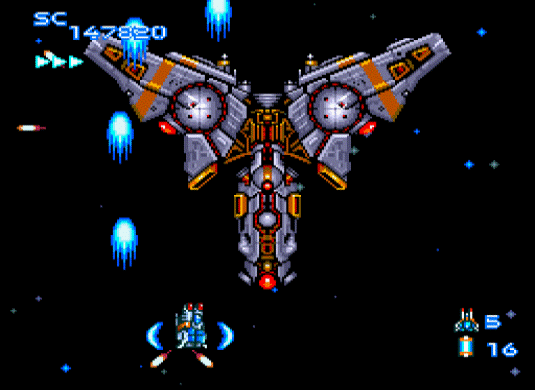
I remember my first encounter with Gunhed in the pages of Computer and Video Games. The PC Engine, along with Sega's MegaDrive were the wave of the future. Though it was debatable whether either of the two machines were more powerful than their 16 bit home computer counterparts in the West, the screenshots oozed quality. They just looked better than anything American and European gamers had encountered outside of the arcade. With my humbled clapped out Spectrum at home, the Gunhed screenshots - just like Tatsujin did a few issues later - woke something in me. A desire to have that experience, to be immersed in something way outside my means but also something cutting edge. And what did it were the bosses. Imposing and relatively intricate behemoths, you just knew going up against them in a comparatively puny spacecraft would make for a great digital ruckus. Such were the things to be gleaned from simple screenshots in those halcyon days.
30 years on from these lustful thoughts, how did finally getting my hands on Gunhed compare to the hopes I had for it? All expectations were met. Save one. The ship handled perfectly and zipped around the screen at just the right speed. The enemies came thick and fast, but not in overwhelming waves - provided the ship, the titular Gunhed, is packing the heavy artillery. And the power ups were fine. Anyone who has played a Compile shooter before knows the styles and the system. Different weapons are represented by numbers, which can alternately be powered up by collecting purple orbs. One is a multi-directional shot, two a wave blaster that can be partially directed, three is lightning - which is fun, and four is a crappy shot with spinning barrier balls. This can be complemented by three secondary weapons: a shield, multiples/options, or homing missiles. All of which come in handy. And naturally the more the ship acquires, the more one feels that false sense of invulnerability common to nearly all shooters. When you die you start off with the pea shooter again, which typically means a cascading collapse toward Game Over. Where Gunhed is a little kinder than its contemporaries is getting a bullet down your snout won't always kill you but knock you back a power level. And with plenty of power ups always available one can climb out of the hole relatively quickly. There's also smart bombs to get you out of a tight spot, but they're not great - they don't clear the screen and there is a delay between pressing the 'please blow them up' button and the fairly naff explosion. A shame.
Where Gunhed palls is in the music department. Expecting something pumping and energetic like a Technosoft game, instead the tune is the twee 80s anime-dramatic style, something it shares with Tatsujin and Super R-Type. A shame. The sound effects, however, are very serviceable and fit the action perfectly. Which is just as well, because the game is perfect action. This is definitely for winding down the higher brain functions and surrendering to the advanced reflexology it offers. Difficulty-wise it's perfectly balanced. A novice can get about half way on the first go, but then the challenge kicks in. The bosses, those oh so beguiling bosses are ... not that hard actually. Some are very well designed, but their attack patterns aren't difficult to master. If your ship is armed with the wave or the lightning they won't be too much trouble - what will be are the attack patterns of the minions and the sheer number of bullets that are thrown on screen. A fog of war can sometimes descend amid the mayhem, none of which ever lets up and, testament to Compile's technical virtuosity, none of it slows down either.
It was then, for its time, almost the perfect shooter. That probably explains why Compile more or less remade it for the Super Nintendo, known to us as Super Aleste. The music is better, but still not the rockfest that was standard when it came out. But it did recycle all of its sound assets, the same power up system (though with beefier weapons and more to choose from), and enemies with the same attributes. The core gameplay remains, and proved Gunhed's worthy successor. But now in the 21st century? After years knocking around the Virtual Console and recent appearance on the permutations of the PC Engine Mini, how is it remembered and how does it fare? As NEC's machine never made it out of import here, Gunhed was only really known by the few who had grabbed a PC Engine or followed C+VG. Curiously it didn't seem to influence later titles in the vertically scrolling genre apart from Compile's own loosely connected Aleste series of games. And so Gunhed, around these parts, is very niche. But it does not deserve to be. Not original when it came out, apart from the music it nails every aspect of how a vertical shooter should look, feel, and play. It is the distillation of a genre that still had many years to run, and one seldom surpassed.
Image Credit
Thank you. I was always a bit puzzled by the fact that the armoured security company van which opens the San Francisco action in William Gibaon's Virtual Light was called Gunhead. Now I see that this is simply Gibson's Japanese fetishism coming to the fore.
ReplyDelete